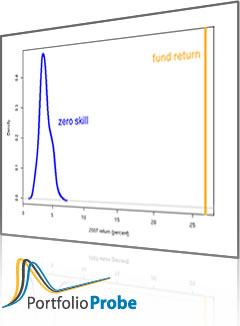Follow us using:
Newsletter Sign-up
Monthly Archives: November 2013
London Quant Group, and other upcoming events
Highlighted London Quant Group 2013 December 9, London. Pat Burns on “Exploring the efficacy of higher moments in portfolio optimisation”. Abstract: Typically portfolio optimisation only uses the first two moments — expected returns and variance. Is it useful to also use skewness and kurtosis? This talk will take a new look at optimisation, and then from … Continue reading
Posted in Events
Leave a comment
US market portrait 2013 week 47
US large cap market returns. Fine print The data are from Yahoo Almost all of the S&P 500 stocks are used (as implied by Wikipedia on 2013 January 5 — see the R commands to scrape the data) The initial post was “Replacing market indices” The R code is in marketportrait_funs.R — you are free … Continue reading
Historical Value at Risk versus historical Expected Shortfall
Comparing the behavior of the two on the S&P 500. Previously There have been a few posts about Value at Risk (VaR) and Expected Shortfall (ES) including an introduction to Value at Risk and Expected Shortfall. Data and model The underlying data are daily returns for the S&P 500 from 1950 to the present. The VaR and … Continue reading
Posted in R language, Risk
Tagged Conditional Value at Risk, Expected Shortfall, S&P 500, Value at Risk
1 Comment
US market portrait 2013 week 46
US large cap market returns. Fine print The data are from Yahoo Almost all of the S&P 500 stocks are used (as implied by Wikipedia on 2013 January 5 — see the R commands to scrape the data) The initial post was “Replacing market indices” The R code is in marketportrait_funs.R — you are free … Continue reading
Review of ‘Thinking, Fast and Slow’ by Daniel Kahneman
I put off reading this book because I thought that I would already know most of its contents. I was wrong. Really wrong. There is a review with a more statistical orientation on the Burns Statistics site. Here the focus is towards economics. The topics that most directly impinge on fund management are: prospect theory versus … Continue reading
US market portrait 2013 week 45
US large cap market returns. Fine print The data are from Yahoo Almost all of the S&P 500 stocks are used (as implied by Wikipedia on 2013 January 5 — see the R commands to scrape the data) The initial post was “Replacing market indices” The R code is in marketportrait_funs.R — you are free … Continue reading
R for Finance, and other upcoming events
Highlighted R for Finance Workshop A two-day course introducing R as applied to finance. 2013 December 3 & 4, London. Lead by Ron Hochreiter with appearances by Pat Burns and others. Details at the Unicom site. New Events Thalesians — New York 2013 November 13, 6PM. Luca Caprioti on “Real time counterparty credit risk management with adjoint … Continue reading
Posted in Events
Leave a comment
Investment performance: measurement versus calculation
I recently had a frustrating — for both parties — conversation involving performance measurement. I said “measurement”. My dialogist heard “calculation” but wanted “measurement”. We went dizzy in the chase. Calculation and Measurement What’s the difference? A calculation is what computers do. A measurement is an assessment. It is a comparison with an ulterior motive. I’m … Continue reading
US market portrait 2013 week 44
US large cap market returns. Fine print The data are from Yahoo Almost all of the S&P 500 stocks are used (as implied by Wikipedia on 2013 January 5 — see the R commands to scrape the data) The initial post was “Replacing market indices” The R code is in marketportrait_funs.R — you are free … Continue reading
Popular posts 2013 October
Most popular posts in 2013 October On smart beta The look of verifying data Quant finance blogs A practical introduction to garch modeling (posted in 2012) The top 7 portfolio optimization problems (posted in 2012) Four moments of portfolios A tale of two returns (posted in 2010) The number 1 novice quant mistake (posted in 2011) Miles of iles (posted … Continue reading
Posted in Blog
Leave a comment
